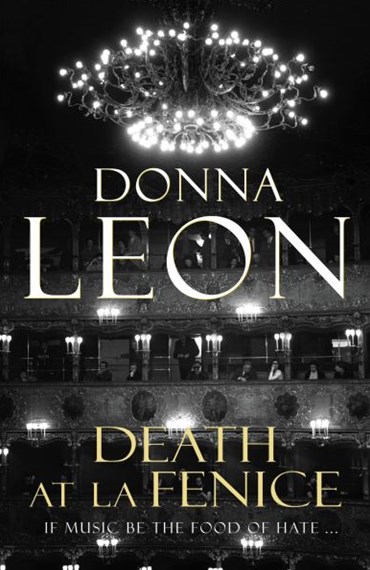Italians know about human nature – they understand human nature perhaps better than anyone else does. They know that people are weak and greedy and lazy and dishonest and they just try to make the best of it; to work around it. Donna Leon
 Binge reading, like binge eating, often comes to a sad and sorry end; you overdose on your favourite treat, and now you almost can’t stand the sight of it.
Binge reading, like binge eating, often comes to a sad and sorry end; you overdose on your favourite treat, and now you almost can’t stand the sight of it.
So it is with me.
I’ve spent a over a month now with Commissario Guido Brunetti in Venice. We’ve chased criminals and corruption, naturally – these are crime novels, after all – but we’ve also spent time drinking coffee or wine in little bars, riding the vaporetto through canals and out into the lagoon. We’ve dined with the patrician in-laws in their palazzo, we’ve gazed at priceless art treasures in hushed churches and we’ve sat down almost every lunchtime to a proper meal. It’s been wonderful.
Did I say these are crime novels? The last book I read, A Venetian Reckoning, had a particularly nasty sexual crime, which gave me nightmares. So enough is enough. If only I’d had the discipline to space them out! But no, I got greedy…
I did the same thing many years ago. A surfeit of Patricia Cornwell led to a very unpleasant incident in the park. A grey wintry day with few walkers in the gardens – I circle the lake with my son in his pusher – a man approaches – paranoia sets in – is he going to kill me? kidnap my child? yes, yes, he is! – my heart thumps with panic, I can’t breathe – we draw level – “Hello,” he says with a smile and I almost collapse…
I read the Brunetti books out of order, depending on what I could borrow from friends, relatives and the library. I only managed to get hold of the first – Death at La Fenice – ten volumes into my streak of fifteen, and it was clear that Donna Leon hit the ground running with the series. By the last – #31, Give Unto Others – you could expect the series to be a little tired, but her characters hadn’t staled. In particular, the adorable Signorina Ellettra continued to delight with her guile and criminality. The themes remained thought-provoking, and the writing, somehow, was still fresh.
It seems like Leon enjoys hanging out with Brunetti in Venice. I know I do. A great deal of the pleasure is simply accompanying the Commissario as he moves around his beloved city, enjoying with him the sights, sounds, smells and tastes. Walking from campo to campo on business, or riding in a vaporetti or motor launch, he’s often dazzled by the outrageous beauty before him – the ancient palazzos, the churches, the bridges and laneways, the water, the sky. It’s his birthright as a Venetian, yet with a mixture of anger and resignation, he sees it passing away. Mass tourism is hollowing out the soul of his city as Venetians leave to live elsewhere; lax laws and official corruption allows pollution to attack the ancient buildings and foul the water.
But the Commissario can always to retreat to his apartment, with his literature  professor wife Paola, his children Raffi and Chiara and a table set with wonderful food and a bottle or two of wine to drink. And perhaps this is what draws me to this series. Brunetti is no dysfunctional, boozing, fast-food addict detective. He reads Greek and Roman philosophers and historians with a coffee and a grappa after his evening meal – and sleeps, usually, very well.
professor wife Paola, his children Raffi and Chiara and a table set with wonderful food and a bottle or two of wine to drink. And perhaps this is what draws me to this series. Brunetti is no dysfunctional, boozing, fast-food addict detective. He reads Greek and Roman philosophers and historians with a coffee and a grappa after his evening meal – and sleeps, usually, very well.
Which brings me back to my nightmares. I’m sure I will return (there are fifteen books I haven’t read!) but for now, it’s farewell to the Commissario and Venice, and on to some more wholesome reading matter, with no rapes, murders, elder abuse or violent beatings, stabbings, poisonings, drownings and defenestrations.
Pollyanna, maybe?
